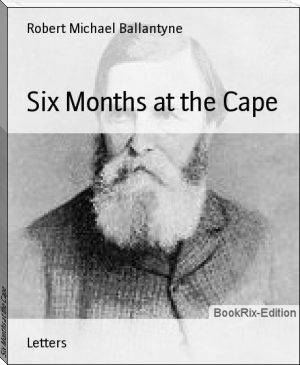Six Months at the Cape - Robert Michael Ballantyne (the little red hen ebook txt) 📗

- Author: Robert Michael Ballantyne
Book online «Six Months at the Cape - Robert Michael Ballantyne (the little red hen ebook txt) 📗». Author Robert Michael Ballantyne
As I have said, there are no roads worthy of the name in many parts of the Karroo. Those that exist are often in such a dilapidated condition that travellers sometimes find it more pleasant to forsake them and drive over the rugged veldt. This can be easily understood when it is remembered that the roads are traversed by the celebrated "Cape wagons," which are of enormous size and weight, requiring from sixteen to twenty oxen to draw them. Such vehicles finding a hollow in a road, soon make it a deep hole, which finally becomes an impassable cavern. In drawing, struggling, and fighting with these wagons, sick and weakly animals constantly succumb, are left to die, and thus vultures are supplied with a continual feast, while carcasses and skulls, and bleaching bones, are familiar objects by the roadsides on the plains.
At last the mail-cart arrived, and I secured a place.
It is usually a small two-wheeled vehicle drawn by four horses, the driver of which seems to think that every one ought to possess an iron frame as callous as his own. The cart has a species of canvas hood, such as I have described in a former letter, stretched on a movable frame. It serves the purpose of a monstrous parasol. You get into this cart, the team is cleverly started by, it may be, a smart fellow, and driven away with the speed at which mails ought to travel; or it is wildly started by a conceited driver, who sets out with a plunge, and continues his course with a prolonged crash, as though the fate of empires reposed in his mail-bags. You come to a ditch; you go in with a plunge, and come out with a jerk. Your head hits the back of the hood when you go in, your nose hits the back of the driver when you come out. A rut in the road causes one wheel to descend suddenly about eighteen inches; or an unavoidable lump of that height produces the same effect; the hood gives you a deliberate punch on the head. Before you have quite recovered, it gives you another. A miniature precipice appears. This was caused by the latest waterspout choosing to cut the road instead of follow it. The mail-cart does not pause. Its springs were made, apparently, to spring. It descends. For one instant you are left in the air, the next you resume your seat--with violence. This sort of thing does not last long, however, for you quickly become wise. You acquire the habit of voluntarily stiffening your backbone at the ditches, of yielding to the ruts, and of holding on at the precipices. Still, with all your precautions, you suffer severely. I have been seriously informed that, during some of their plunges on what may be called stormy roads, men have been jolted bodily out of mail-carts at the Cape, and I can easily believe it.
The Diamond-field mail was full, but they kindly made room for me, and plastered my portmanteau, like an excrescence, on the other baggage.
The drive to Bedford was too short to admit of much familiar intercourse with the diggers,--if diggers they were. Subsequently I met with a successful digger, who told me a good deal about the diamond-fields. He was a Scot, who had left a lucrative claim to be managed by a partner while he took a trip to the "old country." His account of diamond digging inclined me to think that coal-heaving is a much easier occupation, and more remunerative on the whole, except in the case of lucky diggers. This Scot showed me what he called a "big diamond," and allowed me to make a careful drawing of it. He could not guess at its value. If it had been a pure diamond like the "star of South Africa," it would have been worth many thousands of pounds, but it was not pure. According to digger parlance it was "off-colour," and, therefore, not excessively valuable. Still it was a precious gem, and would doubtless fetch several hundreds of pounds. Of course it was unpolished, but even in that state was very beautiful. It weighed seventy-eight carats. The "star of South Africa," above referred to, was a pure and magnificent gem. It was found by a Hottentot, named Swartzboy, sold by him for 400 pounds, and disposed of the same day for 12,000 pounds--so, at least, runs one account of the matter.
Late in the evening we reached Bedford.
As we started next morning at break of day my personal knowledge of that flourishing town is too limited to warrant many remarks thereon. It may be that the vision of ghostly houses passing our cart in the morning mists suggested to my sleepy imagination the idea of a town, but I cannot remember that it did. Possibly the fact that the population numbered above 1000 may have occurred to my mind, but I think not. It is more probable that the mind, if it operated at all, pictured the population as recumbent and snoring. Indeed, the only thing that memory will recall, when severely taxed, in regard to Bedford, is--bed, its first syllable.
------------------------------------------------------------------------
Note 1. The author was an artist as well as a writer of merit, and exhibited water-colour drawings at the Royal Scottish Academy.
LETTER NINE.
CROSSING THE GREAT FISH RIVER--TRAVELLING AT THE CAPE AS IT IS TO BE-- GRAHAMSTOWN, HER EARLY STRUGGLES AND PRESENT PROSPERITY.
Travelling in South Africa is occasionally interrupted by sudden storms of rain which convert dry beds of streams into roaring torrents, and perennial rivers into devastating floods.
At the Great Fish River I came on a specimen of the mighty power of water in the ruins of a splendid bridge. The great floods of the previous year had carried one-half of it away. The other half--denuded of its flooring and all its woodwork, and standing out against the sky a mere skeleton of iron girders--still connected the left bank of the river with the massive tower of masonry in the middle. From this tower to the other bank was a gulf impassable to horse or cart. The great river itself flows in a deep channel. It was still somewhat flooded. From its high banks we saw it roaring more than forty feet beneath the level of the bridge. It was clear to the most ignorant eye that fording the stream was impossible. I looked inquiringly at the driver.
"You'll have to go over on the rope," he said, with a sardonic smile.
"The rope?" said I, with an earnest gaze at the impassable gulf.
"Yes, the rope. There's a man crossing _now_."
I looked again, and observed something like a cobweb on the sky between the central pier and the opposite bank. There was a black spot that resembled a spider moving slowly along the cobweb. It was a fellow-man!
"And the mails and the luggage?" I asked.
"Go over same way."
"The cart and horses?"
"Don't go over at all. Get fresh ones on other side. There was once a box on the river for hauling them over, but it's been damaged."
The process of crossing was begun at once.
The driver and some workmen shouldered the bags and baggage, while the passengers--of whom there were three--followed to the central pier.
To men with heads liable to giddiness the passage from the bank to the pier would have been trying, for, the floor having been carried away, we had to walk on the open girders, looking down past our feet to the torrent as to a miniature Niagara. The distance of forty feet seemed changed to four hundred from that position. Fortunately none of us were afflicted with giddy heads.
The flat space on the tower-top gained, we found two workmen engaged in tying our baggage to a little platform about four feet square, which was suspended by ropes to a couple of little wheels. These wheels travelled on a thick cable,--the spider web before referred to. The contrivance was hauled to and fro by a smaller line after the manner of our rocket apparatus for rescuing life at sea, and, when we passengers afterwards sat down on it with nothing but the tight grip of our hands on an iron bar to save us from falling into the flood below, we flattered ourselves that we had attained to something resembling the experience of those who have been saved from shipwreck.
Many people hold the erroneous doctrine that travellers and traffic create railways, whereas all experience goes to prove that railways create travellers and traffic. Of course at their first beginnings railways were formed by the few hundreds of travellers who were chiefly traffickers, but no sooner were they called into being than they became creative,--they turned thousands of stay-at-homes into travellers; they rushed between the great centres of industry, sweeping up the people in their train, and, with a grand contempt of littleness in every form, caught up the slow-going cars and coaches of former days in their huge embrace, and whirled them along in company with any number you chose of tons and bales of merchandise; they groaned up the acclivities of Highland hills, and snorted into sequestered glens, alluring, nay, compelling, the lonely dwellers to come out, and causing hosts of men, with rod and gun and hammer and botanical box, to go in; they scouted the old highroads, and went, like mighty men of valour, straight to the accomplishment of their ends, leaping over and diving under each other, across everything, through anything, and sticking at nothing, until over lands where, fifty years ago, only carts and coaches used to creep and poor pedestrians were wont to plod, cataracts of travellers now flow almost without intermission night and day--the prince rolling in his royal bedroom from palace to palace; the huntsman flying to the field, with his groom and horse in a box behind him; the artisan travelling in comfort to his daily toil, with his tools and a mysterious tin of victuals at his feet; thousands on thousands of busy beings hurrying through the land where one or two crawled before; shoals of foreigners coming in to get rid of prejudices and add "wrinkles to their horns," while everything is cheapened, and, best of all, knowledge is increased by this healthy--though, it may be, rather rapid--moving about of men and women.
Thus railways have created travellers and traffic.





Comments (0)